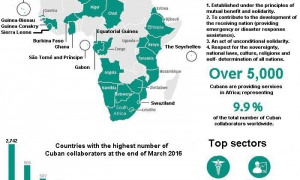 Cuba is renowned for its worldwide collaboration efforts, due among other reasons, to the readiness of Cuban doctors to go wherever they are needed, including remote areas or in response to natural disasters or epidemics.
Cuba is renowned for its worldwide collaboration efforts, due among other reasons, to the readiness of Cuban doctors to go wherever they are needed, including remote areas or in response to natural disasters or epidemics.
Likewise, educational and sports specialists share their knowledge in several sister nations, while technicians from other spheres such as agriculture also make an important contribution.
The fact is that Cuban collaborators are always ready and willing to offer services wherever they are needed.
It is precisely Cuba’s legacy of collaboration in Africa that represents one of the finest examples of the island’s solidarity efforts.
In May 1963, Algeria was the first African country to receive an international medical brigade sent from Cuba, where 55 collaborators offered services to the people of that nation for one year.
Later, in the 1970s and 80s, Ethiopia and Angola, among other countries, received medical and military assistance. A contingent of teachers was sent to Angola, where they remained over the course of eight academic years, even during the country’s independence struggles.
Since the triumph of the Revolution through 2015, over one million Cubans have provided services in more than 160 countries worldwide, while almost 30,000 health, education, sports, science, and construction collaborators, among other disciplines, have offered assistance across the entire African continent.
International collaboration is without a doubt one of the fundamental components of the Revolution’s foreign policy; a non-political initiative based on the principles of solidarity and humanism. Despite having reached various countries across the globe, Cuban collaboration has been concentrated in sister nations of the Third World.
When reviewing the island’s international collaboration efforts it is impossible not to mention cooperation in the sphere of health, which has won Cuba worldwide recognition and prestige.
One of the most recent examples, recognized globally, and by organizations such as the African Union, United Nations and World Health Organization, was the brigade of 256 Cuban health professionals – members of the Henry Reeve Contingent – sent to Guinea Conakry, Liberia and Sierra Leone, to help combat the Ebola epidemic.